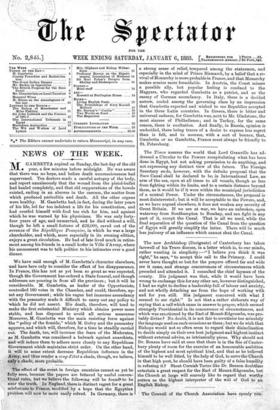The new Archbishop (Designate) of Canterbury has taken farewell of
his Truro diocese, in a letter which is, to our minds, rather wanting in simplicity :—" I believe you think it was right," he says, "to accept this call to the Primacy. I could never have thought so but for the prayers offered far and wide ere it came, and strange concurrences of circumstances which preceded and attended it. I consulted the chief layman of the county. His judgment was that, while it would have been wrong to exchange this for any other see, however distinguished, I had no right to decline a leadership full of labour and anxiety, and not wholly detaching me from the hope of working with and for you still. His judgment concurred with what I seemed to see right." Is not that a rather elaborate way of saying that a call which came in answer to prayer, which seemed strangely Providential in its concurrence of circumstances, and which was sanctioned by the Earl of Mount-Edgcumbe, was pro- bably divine P No doubt, it is not fair to scrutinise too minutely the language used on such occasions as these; but we do wish that Bishops would not so often seem to regard their disinclination to decide simply on their own best judgment and highest instinct without external advice, as intrinsically pions. Why should not Dr. Benson have said at once that there is in the See of Canter- bury plenty of room for the exercise of an honourable ambition of the highest and most spiritual kind, and that as he believed himself to be well fitted, by the help of God, to serve the Church in that high post, he should have been guilty of a false humility in refusing it P Stout Cornish Tories like Dr. Benson doubtless entertain a great respect for the Earl of Mount-Edgcumbe, but the Church at large will scarcely like to regard that worthy person as the highest interpreter of the will of God to an English Bishop.














































 Previous page
Previous page